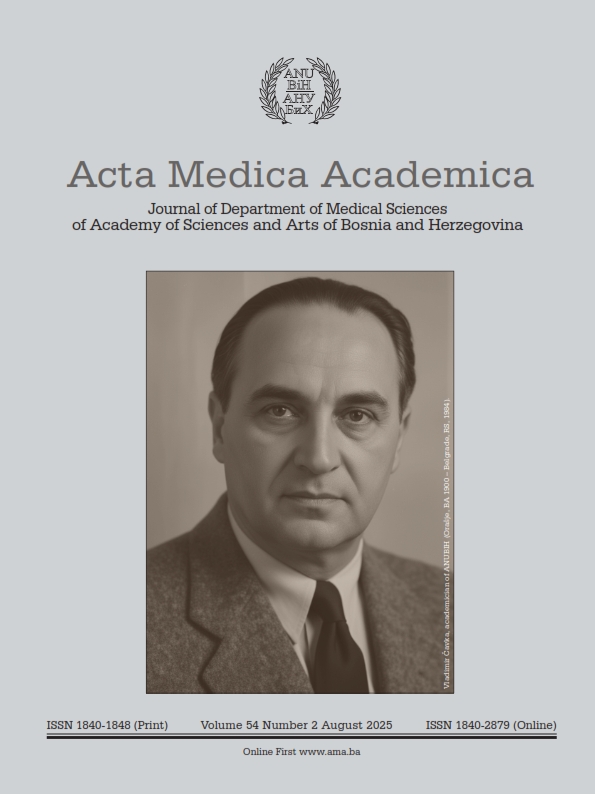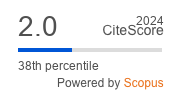The Possible Role of Immunotherapy in Locally Advanced Pancreatic Cancer Treatment
DOI:
https://doi.org/10.5644/ama2006-124.479Keywords:
Locally Advanced Pancreatic Cancer, Immunotherapy, Oncology, Immune Checkpoint InhibitorsAbstract
Objective. Locally advanced pancreatic cancer (LAPC) represents a significant subset of pancreatic cancers and is characterized by a poor prognosis and limited treatment options. Conventional therapies, including chemoradiotherapy, have demonstrated limited success, prompting interest in innovative strategies, such as immunotherapy. This review evaluates the role of immunotherapy in LAPC.
Materials and Methods. For this review, a comprehensive search of the PubMed database was conducted in August 2024. After applying the exclusion criteria, 26 studies were included in the analysis.
Results. Immune checkpoint inhibitors have produced inconsistent clinical outcomes, with modest improvements in progression-free survival and significant side effects. Cancer vaccines, particularly GVAX in combination regimens, have demonstrated potential, as have fibroblast activation protein (FAP) and mKRAS-specific amphiphile vaccines in preclinical and clinical settings. Chimeric antigen receptor (CAR) T-cell therapies targeting various antigens have yielded encouraging outcomes but have faced safety and efficacy challenges. Emerging approaches, including Toll-like receptor agonists, tumor-associated macrophage targeting, and radioimmunotherapy, have also shown preclinical promise but require further study. Despite numerous investigations, the overall impact of immunotherapy on LAPC remains limited. Some combination therapies involving checkpoint inhibitors, vaccines, and CAR T cells have shown positive outcomes; however, many are hindered by the immunosuppressive environment and toxicity of tumors. Recent studies emphasize the need for further research to refine these strategies and improve treatment options.
Conclusion. LAPC remains one of the deadliest malignancies, with immunotherapy offering potential but constrained by limited survival benefits and adverse effects. Further studies focusing on novel agents, refined combinations, and overcoming tumor resistance mechanisms are critical to improve outcomes for this challenging disease.
References
Zhou B, Zhang SR, Chen G, Chen P. Developments and challenges in neoadjuvant therapy for locally ad-vanced pancreatic cancer. World J Gastroenterol. 2023;29(35):5094-103. doi: 10.3748/wjg.v29.i35.5094.
Ducreux M, Seufferlein T, Van Laethem JL, Laurent-Puig P, Smolenschi C, Malka D, et al. Systemic treatment of pancreatic cancer revisited. Semin Oncol. 2019;46(1):28-38. doi: 10.1053/j.seminoncol.2018.12.003. Epub 2018 Dec 27.
Kaufman HL, Di Vito J Jr, Hörig H. Immunotherapy for pancreatic cancer: current concepts. Hematol Oncol Clin North Am. 2002;16(1):159-97, viii. doi: 10.1016/s0889-8588(01)00002-8.
Blaszkowsky L. Treatment of advanced and metastatic pancreatic cancer. Front Biosci. 1998;3:E214-25. doi: 10.2741/a380.
Garnier J, Turrini O, Chretien AS, Olive D. Local Ablative Therapy Associated with Immunotherapy in Locally Advanced Pancreatic Cancer: A Solution to Overcome the Double Trouble? - A Comprehensive Review. J Clin Med. 2022;11(7):1948. doi: 10.3390/jcm11071948.
Brozos-Vázquez E, Toledano-Fonseca M, Costa-Fraga N, García-Ortiz MV, Díaz-Lagares Á, Rodríguez-Ariza A, et al. Pancreatic cancer biomarkers: A pathway to advance in personalized treatment selection. Cancer Treat Rev. 2024;125:102719. doi: 10.1016/j.ctrv.2024.102719. Epub 2024 Mar 12.
Gupta N, Yelamanchi R. Pancreatic adenocarcinoma: A review of recent paradigms and advances in epidemiology, clinical diagnosis and management. World J Gas- troenterol. 2021;27(23):3158-81. doi: 10.3748/wjg.v27. i23.3158.
Passero FC Jr, Saif MW. Second line treatment options for pancreatic cancer. Expert Opin Pharmacother. 2017;18(15):1607-17. doi: 10.1080/14656566.2017.1369955. Epub 2017 Oct 6.
Lankadasari MB, Mukhopadhyay P, Mohammed S, Harikumar KB. TAMing pancreatic cancer: combat with a double edged sword. Mol Cancer. 2019;18(1):48. doi: 10.1186/s12943-019-0966-6.
Zhu S, Cheng Q, Zou M, Li C, Tang Y, Xia L, et al. Combining bulk and scRNA-seq to explore the molecular mechanisms governing the distinct efferocytosis activities of a macrophage subpopulation in PDAC. J Cell Mol Med. 2024;28(7):e18266. doi: 10.1111/jcmm.18266.
Megdanova-Chipeva VG, Lamarca A, Backen A, McNa- mara MG, Barriuso J, Sergieva S, et al. Systemic Treat- ment Selection for Patients with Advanced Pancreatic Neuroendocrine Tumours (PanNETs). Cancers (Basel). 2020;12(7):1988. doi: 10.3390/cancers12071988.
Sarantis P, Koustas E, Papadimitropoulou A, Papavassiliou AG, Karamouzis MV. Pancreatic ductal adenocarcinoma: Treatment hurdles, tumor microenvironment and immunotherapy. World J Gastrointest Oncol. 2020;12(2):173-81. doi: 10.4251/wjgo.v12.i2.173.
Garrido-Laguna I, Hidalgo M. Pancreatic cancer: from state-of-the-art treatments to promising novel therapies. Nat Rev Clin Oncol. 2015;12(6):319-34. doi: 10.1038/ nrclinonc.2015.53. Epub 2015 Mar 31.
Yeo D, Giardina C, Saxena P, Rasko JEJ. The next wave of cellular immunotherapies in pancreatic cancer. Mol Ther Oncolytics. 2022;24:561-76. doi: 10.1016/j. omto.2022.01.010.
Chadha AS, Khoo A, Aliru ML, Arora HK, Gunther JR, Krishnan S. Recent Advances and Prospects for Multimodality Therapy in Pancreatic Cancer. Semin Radiat Oncol. 2016;26(4):320-37. doi: 10.1016/j.semra- donc.2016.05.002. Epub 2016 May 26.
Lai E, Puzzoni M, Ziranu P, Pretta A, Impera V, Mari- ani S, et al. New therapeutic targets in pancreatic cancer. Cancer Treat Rev. 2019;81:101926. doi: 10.1016/j. ctrv.2019.101926. Epub 2019 Nov 11.
Bendell J, LoRusso P, Overman M, Noonan AM, Kim DW, Strickler JH, et al. First-in-human study of oleclumab, a potent, selective anti-CD73 monoclonal antibody, alone or in combination with durvalumab in patients with advanced solid tumors. Cancer Immunol Immunother. 2023;72(7):2443-58. doi: 10.1007/s00262-023-03430-6. Epub 2023 Apr 5.
Puré E, Lo A. Can Targeting Stroma Pave the Way to Enhanced Antitumor Immunity and Immunotherapy of Solid Tumors? Cancer Immunol Res. 2016;4(4):269-78. doi: 10.1158/2326-6066.CIR-16-0011.
Delitto D, Zabransky DJ, Chen F, Thompson ED, Zim- merman JW, Armstrong TD, et al. Implantation of a neoantigen-targeted hydrogel vaccine prevents recurrence of pancreatic adenocarcinoma after incomplete resection. Oncoimmunology. 2021;10(1):2001159. doi: 10.1080/2162402X.2021.2001159.
Pant S, Wainberg ZA, Weekes CD, Furqan M, Kasi PM, Devoe CE, et al. Lymph-node-targeted, mKRAS-specific amphiphile vaccine in pancreatic and colorectal cancer: the phase 1 AMPLIFY-201 trial. Nat Med. 2024;30(2):531-42. doi: 10.1038/s41591-023-02760-3. Epub 2024 Jan 9.
Stoltzfus CR, Sivakumar R, Kunz L, Olin Pope BE, Me- nietti E, Speziale D, et al. Multi-Parameter Quantitative Imaging of Tumor Microenvironments Reveals Perivas- cular Immune Niches Associated With Anti-Tumor Immunity. Front Immunol. 2021;12:726492. doi: 10.3389/ fimmu.2021.726492.
Reddy AV, Hill CS, Sehgal S, Zheng L, He J, Laheru DA, et al. Post-radiation neutrophil-to-lymphocyte ratio is a prognostic marker in patients with localized pancreatic adenocarcinoma treated with anti-PD-1 antibody and stereotactic body radiation therapy. Radiat Oncol J. 2022;40(2):111-9. doi: 10.3857/roj.2021.01060. Epub 2022 May 20.
Hirooka Y, Itoh A, Kawashima H, Hara K, Nonogaki K, Kasugai T, et al. A combination therapy of gemcitabine with immunotherapy for patients with inoperable locally advanced pancreatic cancer. Pancreas. 2009;38(3):e69-74. doi: 10.1097/MPA.0b013e318197a9e3.
Zhang M, Huang L, Ding G, Huang H, Cao G, Sun X, et al. Interferon gamma inhibits CXCL8-CXCR2 axis mediated tumor-associated macrophages tumor trafficking and enhances anti-PD1 efficacy in pancreatic cancer. J Immunother Cancer. 2020;8(1):e000308. doi: 10.1136/jitc-2019-000308.
Meyer JJ, Willett CG, Czito BG. Is there a role for advanced radiation therapy technologies in the treatment of pan- creatic adenocarcinoma? Future Oncol. 2008;4(2):241-55. doi: 10.2217/14796694.4.2.241.
Downloads
Published
License
Copyright (c) 2025 Rouan Barakat, Despoina Sidira, Athanasios Stavropoulos, Nikias Konsolas, Andreas Palantzas, Dimitrios Filippou

This work is licensed under a Creative Commons Attribution 4.0 International License.





